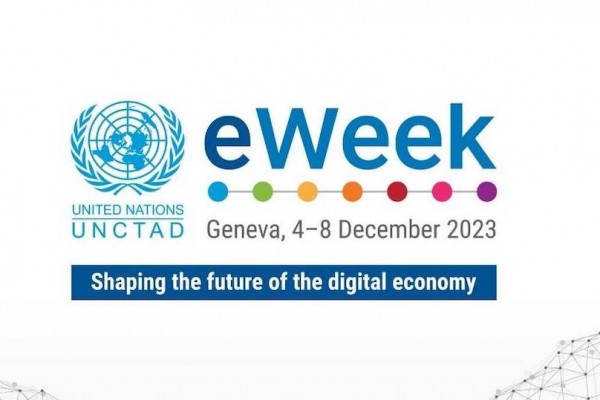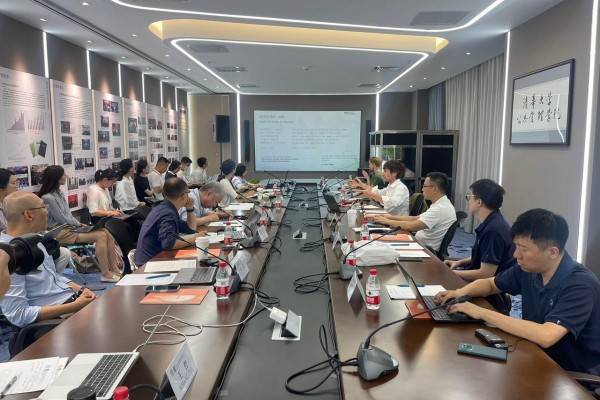On March 10, Alexey Ivanov, Director of the International BRICS Competition Law and Policy Centre, spoke on a panel "Digitalisation and Protection" at the "Third Digital Day" organized by the University of Florence.
The event was dedicated to the problems of digitalization. Among the participants were leading representatives of academia in the field of "digital", experts and scientists from all over the world. The topic of Alexey's report was "Sustainability of the digital ecosystem: a challenge for competition policy."
In his opening remarks, Ettore Maria Lombardi, Professor at the University of Florence, noted that as digitalization increases, so does the importance of protection and security. He stressed that the name of the panel "Digitalisation and Protection" entails a discussion of protection in different senses of the word — from the protection of users' privacy to the environmental protection and the problem of overprotection by the state.
The Director of the BRICS Competition Law and Policy Centre Alexey Ivanov spoke about the ecoantitrust project that the centre is developing together with the International Institute for Applied Systems Analysis (IIASA). Modern IT corporations (Microsoft, Tencent, Alibaba, etc.) define themselves as ecosystems, and the regulators should pay attention to such self-identification of Big Techs, believes Alexey Ivanov. The digital revolution has changed the organization of business. These are no longer Ford factories with an industrial model of production and a clear structure, but flexible, adaptive systems that defy the usual logic and regulatory methods of the industrial era.
The fragmented approach of antitrust agencies in different countries to digital giants has had little effect. Instead of looking at digital platforms as a holistic phenomenon and coordinating efforts, regulators continue to act disparately, periodically fining IT companies for certain violations, with little effect on their monopoly power.
Ecoantitrust offers a holistic approach to regulation based on the analogy of digital and natural ecosystems. This method allows us to take into account the cyclical nature of digital platforms, which changes the idea of the regulator's tasks as well. For example, Alexey Ivanov suggested considering the development cycle of the Android platform, which has passed through different stages, from its emergence as an open-source system and growth after the takeover by Google to its transformation into a complete ecosystem and externalization (the spread of monopoly power and suppression of independent developers).
"The decisions by the Russian FAS in 2015 and the European Commission in 2018 regarding Google's abuse of its dominant position in the market for Android devices did not take into account the cyclical nature of the ecosystem. When a critical mass of users and developers came to the platform, the ecosystem transformed and became more proprietary. Regulators interfere only at the externalization stage, when Google already profits monopolistically from this more closed proprietary platform,"
emphasized Alexey Ivanov.
Moreover, the regulators' decisions were aimed at reversing the development cycle of the platform, returning it to its previous stage, which is impossible. The ecological method of thinking, on the contrary, involves continuing the cycle and passing the platform through the stage of decay/rebirth, so that it can continue development, but already in a new quality.
Thus, ecoantitrust is a holistic approach and provides a more complete understanding of the processes occurring within ecosystems. According to Ivanov, competition authorities should not act like mechanics who think of business as a machine and try to replace individual broken parts in it.
"The regulator is more of a gardener who understands digital platforms as organically evolving systems whose growth direction can be intelligently adjusted. In this sense, ecoantitrust will help overcome regulatory differences across states and regional groups, which will make the digital economy more sustainable,"
summarized the BRICS Centre director.
Stanislas Adam, Secretary of the European Court of Justice, touched on the threats of digitalization. Social media and communication services increasingly resemble smart devices that form the Internet of Things (IoT). These devices may promise to improve our daily lives, but at the same time raise serious concerns in terms of data protection, because their functioning and efficiency are closely linked to the use of data or metadata, the expert noted. He also drew attention to the importance of legislative developments in the European Artificial Intelligence Act (EU AI Act), which is scheduled for adoption in 2023, and the EU General Data Protection Regulation (GDPR).
The topic of social networks was continued by Elena Rovenskaya, Program Director of the International Institute for Applied Systems Analysis (IIASA). She noted that social networks are the most important source of data that can be used for the public good. For example, Russian IT-giant Yandex has developed a specialized index of self-isolation, which is based on open, anonymized data obtained from the company's applications. The Russian authorities used the index for informational purposes to approximate the situation during the coronavirus pandemic. At the same time, Yelena noted, social networks can facilitate the spread of inaccurate information, conspiracy theories and fakes.
The questions of copyright compliance in the context of digital platforms were also discussed. Henning Grosse Ruse-Khan, Co-director of the Center for Intellectual Property and Information Law (CIPIL), elaborated on the principles of YouTube Content ID, a system for identifying and managing copyrighted content.
"States often rely on global platforms as key intermediaries to enforce state laws vis-à-vis users, or as gatekeepers of technology and/or data, but that gives essential power and control to platforms in how laws are applied & enforced, and how states use data and technology to fulfill state functions,"
said the speaker.
Nicolas Petit, Professor at the European University Institute (EUI), addressed the problems of the regulatory mechanisms underlying the European Artificial Intelligence Act (EU AI Act), which attempts to combine the ideas of product safety and the protection of fundamental rights. For example, the AI Act's regulatory structure relies on existing product safety institutions and does not address the need to develop new capabilities to protect fundamental rights in the context of AI.
“While product safety requirements and standardization can play an important role in AI governance, they should not be the only game in town. Instead, their shortcomings should be addressed by ad hoc instruments, dealing with the risks to fundamental rights created by specific applications. Of course, that approach leads to increased regulatory fragmentation compared to a centralized, horizontal instrument. But it is the price to ensure suitable protection of fundamental rights,”
believes Nicolas Petit.
Mark Roe, Professor at Harvard Law School, concluded the session by raising the issue of the misperceived connection between environmental problems and short-termism of stock market. A stock market of rapid traders is thought to ignore business sustainability and climate change issues. However, thinking that the climate problem is in large measure a stock market time horizon problem makes it easier for policymakers, because that thinking diminishes the pressure they would otherwise feel to pursue effective but politically stressful action, the professor believes.
“Fulminating against stock market short-termism as causing climate change—and even taxing the corporation or the stock or the trading of the stock—will not motivate anti-government populism but will satisfy it. Unpopular government actions—like enacting an effective carbon tax or taxing us more at the gas pump—will, in contrast, damage a governing party’s popularity,”
noted Mark Roe.



